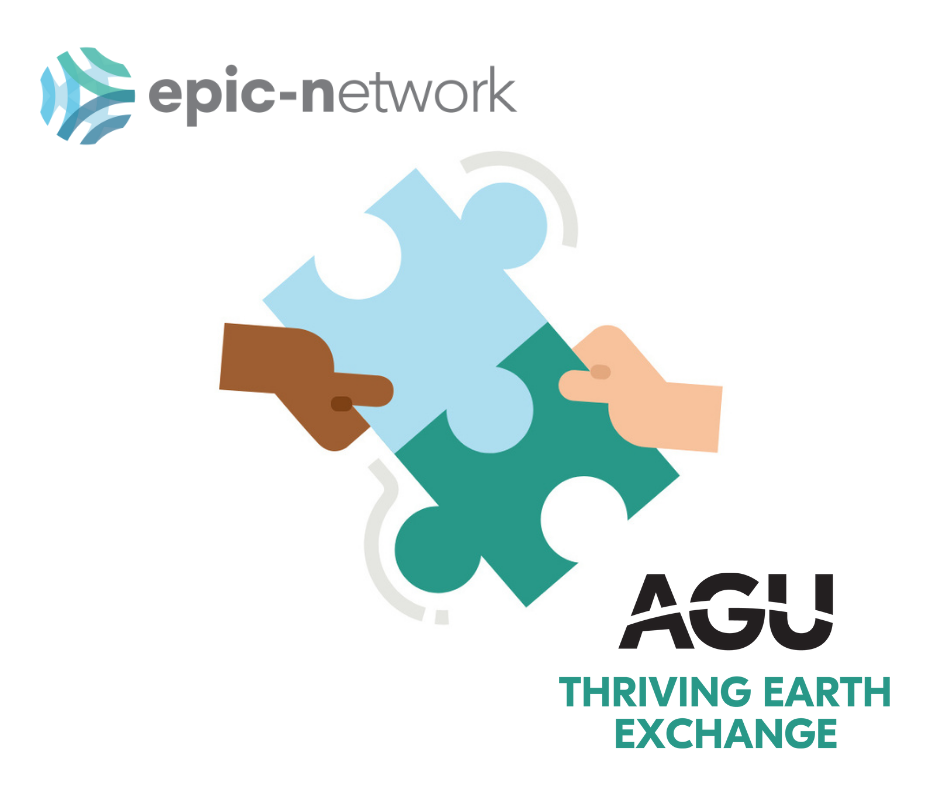
Capacity is often in short supply in local government. It can be hard to know where to turn to find much-needed support, useful resources, and innovative ideas, particularly when it comes to research and science.
Two organizations are partnering to change that. The Educational Partnerships for Innovation in Communities – Network (EPIC-N) program and AGU’s Thriving Earth Exchange (Thriving Earth) program both have much to offer local governments – including valuable capacity for, and creative ways to, solve problems communities have identified.
EPIC-N and Thriving Earth first connected back in 2018. Now, we are excited to announce a new level of collaboration between our two organizations.
Under our new Memorandum of Understanding (MOU), Thriving Earth Exchange and EPIC-N can create an impact that’s greater than the sum of its parts, so that even more people and communities can build lasting solutions.
We share a commitment to:
- Center community priorities in scientific and academic practice.
- Increase communities’ access to the data, human capital, resources, and networks that universities and scientists can provide.
- Encourage our shared audiences and partners – including but not limited to community-serving organizations, universities, the scientific community, local governments, and students – to engage in community-led initiatives.
Specifically, the organizations will do more to:
- Coordinate, share, and elevate successful partnership and project stories – For example, one of our
 mutual connections, NASA Develop has initiated a virtual panel and poster session highlighting experiential leading models in geoscience classes as a part of AGU’s Fall Meeting scheduled December 13-17, 2021. Our two organizations will share each other’s stories on our respective platforms and channels to amplify our work.
mutual connections, NASA Develop has initiated a virtual panel and poster session highlighting experiential leading models in geoscience classes as a part of AGU’s Fall Meeting scheduled December 13-17, 2021. Our two organizations will share each other’s stories on our respective platforms and channels to amplify our work. - Connect project leaders, teams and initiatives that are geographically close to each other to foster coordination and information-sharing.
- Provide direct technical support when and where it is needed.
We are excited to share more information and updates about this partnership and upcoming programming. These stories will be shared across both organizations’ communication channels, but we encourage you to follow us both for all the latest!
You can check out previous materials and resources below:
- Webinar and resources to help EPIC-N Program Managers understand Thriving Earth and the potential benefits from trying to work together (This link goes to the EPIC-N Member Commons – create a free trial or login to view, or view a Youtube-only version of the webinar here.) – Recorded Feb 20, 2020
- Blog with webinar recording and resources to help Thriving Earth fellows understand EPIC-N programs and the potential benefits of our work together – Published Nov 12, 2020
About EPIC-N:
The Educational Partnerships for Innovation in Communities – Network (EPIC-N) is a nonprofit association with members all over the world. EPIC-N’s organization and members unite the human capital of universities with local governments, and communities, to improve the quality of life and social wealth for all involved.
The local programs of EPIC-N tackle the most pressing problems identified by local governments and communities by accessing the human capital of universities. EPIC-N programs all operate autonomously, but have adopted the EPIC Model. The model is simple but powerful. It brings together the greatest resources in academia — professors, students, laboratories, research libraries, existing curriculum — and creatively draws them together to tackle the biggest challenges in local communities. The results are felt immediately with lasting transformative effects. Here’s a brief video summarizing how the model works.
About Thriving Earth Exchange:
AGU’s Thriving Earth Exchange advances community solutions. We help scientists, community leaders and partner organizations work together to solve local challenges related to natural resources, climate change and natural hazards through community science.
Community science happens when communities and scientists do science together to advance community priorities. “Doing science” includes defining questions, designing protocols, collecting and analyzing data, and using scientific knowledge in decision-making. Every community science project begins with community voice, is guided by community knowledge, and ends in community impact.
Thriving Earth Exchange launched in 2013. Over 160 projects have been launched since our inception. There are Thriving Earth projects in 10 countries and 39 states!
